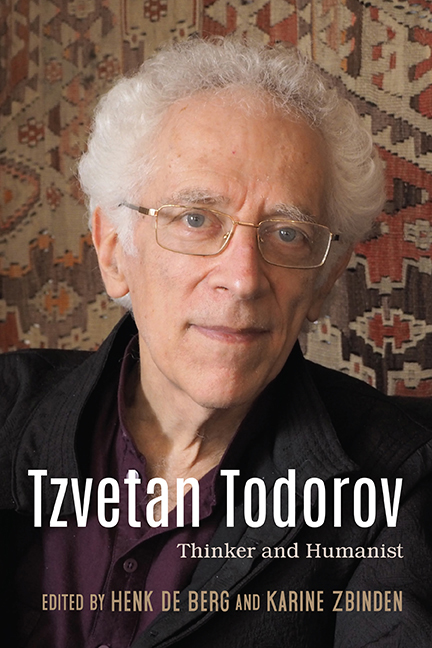Book contents
- Frontmatter
- Contents
- Acknowledgments
- Introduction
- 1 A Marginal Centrist: Tzvetan Todorov and the French Intellectual Field
- 2 Todorov and Camus
- 3 The Enlightenment Redux: Autonomy in Todorov, Glucksmann, and Onfray
- 4 Todorov's Reading of Rousseau: A Heritage for Our Times?
- 5 Tzvetan Todorov's Enlightenment
- 6 Todorov and Bakhtin
- 7 Tzvetan Todorov and the Writing of History
- 8 Tzvetan Todorov and the Trials of History: A Dissenting Voice
- 9 European Integration and the Cultural Cold War: Todorov and Denis de Rougemont
- 10 Tzvetan Todorov on Totalitarianism, Scientism, and Utopia
- 11 Tzvetan Todorov's Political Philosophy
- 12 Interview with Tzvetan Todorov
- Notes on the Contributors
- Index
11 - Tzvetan Todorov's Political Philosophy
Published online by Cambridge University Press: 26 April 2020
- Frontmatter
- Contents
- Acknowledgments
- Introduction
- 1 A Marginal Centrist: Tzvetan Todorov and the French Intellectual Field
- 2 Todorov and Camus
- 3 The Enlightenment Redux: Autonomy in Todorov, Glucksmann, and Onfray
- 4 Todorov's Reading of Rousseau: A Heritage for Our Times?
- 5 Tzvetan Todorov's Enlightenment
- 6 Todorov and Bakhtin
- 7 Tzvetan Todorov and the Writing of History
- 8 Tzvetan Todorov and the Trials of History: A Dissenting Voice
- 9 European Integration and the Cultural Cold War: Todorov and Denis de Rougemont
- 10 Tzvetan Todorov on Totalitarianism, Scientism, and Utopia
- 11 Tzvetan Todorov's Political Philosophy
- 12 Interview with Tzvetan Todorov
- Notes on the Contributors
- Index
Summary
IT MIght seem audacious to discuss the political philosophy of a man who viewed himself neither as a philosopher nor as someone who was particularly “plugged into” reality. yet there are good reasons for doing so. first, todorov was always excessively modest about his achievements, and his own assessment of himself and of his work should be taken with a grain of salt. second, there is in his oeuvre a clear development from literary criticism and literary theory to cultural studies and philosophy, and many of the topics he addresses in his later work—such as the war in iraq, the use of torture, and the challenges of large-scale migration—fall squarely in the area of political thought. third, while todorov's individual interventions in this area have by no means gone unnoticed, they have not so far generated systematic and in-depth reflection on his overall politico-philosophical position. moreover, the scholars who discuss his work tend to offer either unqualified praise or equally one-sided condemnation.in this chapter, then, i wish to examine tzvetan todorov's political philosophy from both a more comprehensive and a more critical point of view; that is to say, to render visible its theoretical foundations and core principles and to assess the practical real-world conclusions he draws from them. in so doing, i shall be following the example of todorov himself, who consistently stresses the importance of reaching beyond any simplistic positive/negative dichotomies.
Anthropology
The best access point into Todorov's political philosophy, it seems to me, is his anthropology—his Enlightenment-inspired view of humans as social beings. Before addressing his general anthropological view, however, I wish to look in some detail at his interpretation and use of two specific anthropological notions, those of free will and barbarity.
In the first part of Les ennemis intimes de la democratie (2012), Todorov returns to the ancient controversy between Pelagius and St. Augustine. Whereas the former had propounded that people had been given free will by God and were therefore able to bring about their own salvation, the latter had maintained that the existence of original sin meant that no one could be saved by his own efforts.
- Type
- Chapter
- Information
- Tzvetan TodorovThinker and Humanist, pp. 188 - 235Publisher: Boydell & BrewerPrint publication year: 2020

